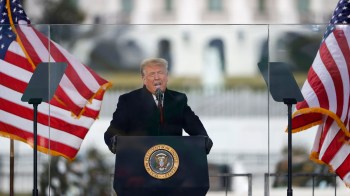Obama: U.S. involvement in Libya is a humanitarian, coalition effort
Obama: U.S. involvement in Libya is a humanitarian, coalition effort
Kai Ryssdal: Tonight President Obama laid out his case for American involvement in Libya. Reading between the lines a little bit, the president said it would have been more costly — in every sense of the word — not to get involved. Marketplace’s Nancy Marshall Genzer is here to talk about the speech. Hey Nancy.
Nancy Marshall Genzer: Hey Kai.
Ryssdal: So what did the president say? What is his rationale?
Marshall Genzer: Well, the president said that the U.S. is on a humanitarian mission in Libya. He said Libyan leader Muammar Gaddafi had launched a military campaign against the Libyan people. The president said Gaddafi called his people “rats” and threatened to go door-to-door killing his opponents. The president said the U.S. military role is limited to protecting those Libyan civilians; the goal is not to oust Gaddafi. And he said NATO has agreed to take command of the mission, sharing the financial burden.
Barack Obama: Because of this transition to a broader, NATO-based coalition, the risk and costs of this operation to our military and to American taxpayers will be reduced significantly.
Ryssdal: So if we’re not footing the bill ourselves, did he say what we are going to pay for this?
Marshall Genzer: Well, no he did not. In fact, the White House says it doesn’t need any extra money for the operation in Libya, as least so far. It’s not submitting a separate spending request, like it does for the wars in Iraq and Afghanistan. And basically, the president is saying, ‘Look, I’m not spending any more money. I’m just shifting money around that’s already in the defense budget to pay for what we’re doing in Libya.’
Listen to what James Thurber has to say about this, Kai. He’s a political scientist at American University here in Washington.
James Thurber: If he takes money from another account in the defense budget, that’s a zero-sum game. That means we don’t buy more weapons or we don’t train more military people, if he lives within that budget.
Ryssdal: What about, though, Nancy, when this over — when the fighting is actually over and somebody has to rebuild? As the president said tonight, the civic institutions in Iraq and the parts of that society that have been torn apart for the past 40 years. What about the rebuilding and reconstruction?
Marshall Genzer: It is definitely going to cost some money. We have no idea at this point how much. And the Obama administration really isn’t too eager to talk about it. At this point, they’re saying any rebuilding is going to be an international effort, that we won’t be the only ones ponying up toward that effort. There’s a big international conference on Libya tomorrow in London, and Secretary of State Hillary Clinton is headed there. Administration officials who talked about this earlier today said Secretary Clinton will be talking about an exit strategy at that conference. And the administration is going to great lengths to make it clear that we will not be the only ones paying the bill, and this will be a coalition effort.
Ryssdal: Marketplace’s Nancy Marshall Genzer in Washington tonight for us, covering the president’s speech on Libya. Nancy, thanks a lot.
Marshall Genzer: You’re welcome.
There’s a lot happening in the world. Through it all, Marketplace is here for you.
You rely on Marketplace to break down the world’s events and tell you how it affects you in a fact-based, approachable way. We rely on your financial support to keep making that possible.
Your donation today powers the independent journalism that you rely on. For just $5/month, you can help sustain Marketplace so we can keep reporting on the things that matter to you.


















